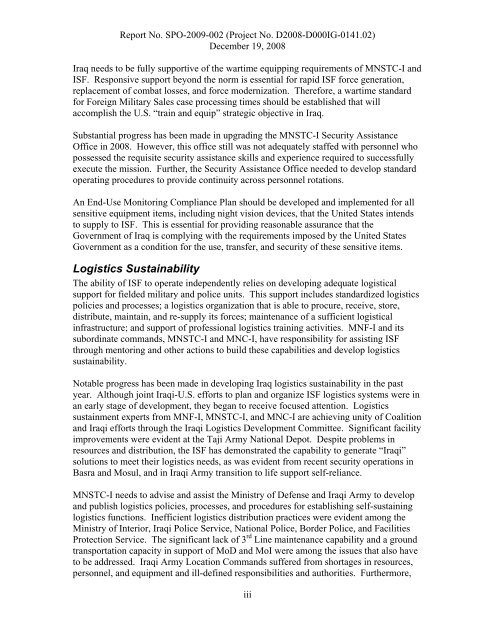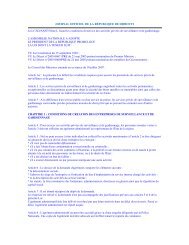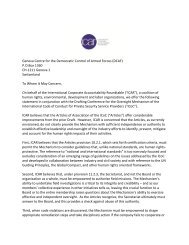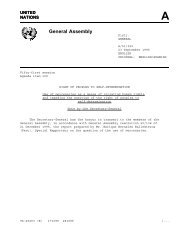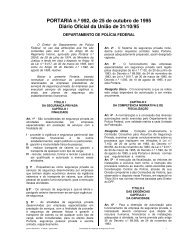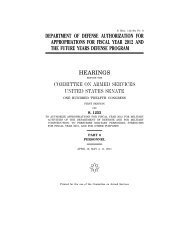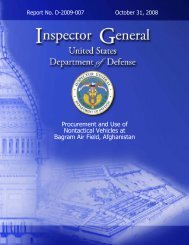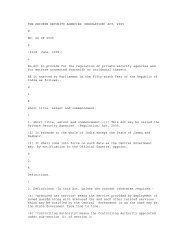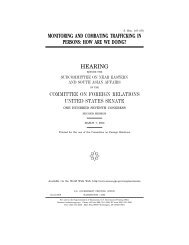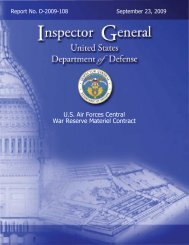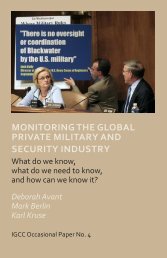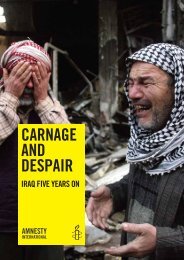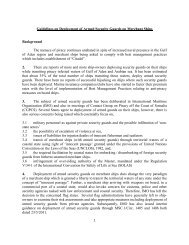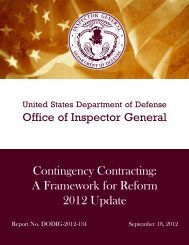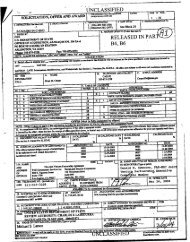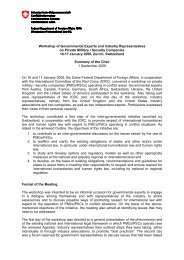Security Assistance; and Logistics - Federation of American Scientists
Security Assistance; and Logistics - Federation of American Scientists
Security Assistance; and Logistics - Federation of American Scientists
You also want an ePaper? Increase the reach of your titles
YUMPU automatically turns print PDFs into web optimized ePapers that Google loves.
Report No. SPO-2009-002 (Project No. D2008-D000IG-0141.02)December 19, 2008Iraq needs to be fully supportive <strong>of</strong> the wartime equipping requirements <strong>of</strong> MNSTC-I <strong>and</strong>ISF. Responsive support beyond the norm is essential for rapid ISF force generation,replacement <strong>of</strong> combat losses, <strong>and</strong> force modernization. Therefore, a wartime st<strong>and</strong>ardfor Foreign Military Sales case processing times should be established that willaccomplish the U.S. “train <strong>and</strong> equip” strategic objective in Iraq.Substantial progress has been made in upgrading the MNSTC-I <strong>Security</strong> <strong>Assistance</strong>Office in 2008. However, this <strong>of</strong>fice still was not adequately staffed with personnel whopossessed the requisite security assistance skills <strong>and</strong> experience required to successfullyexecute the mission. Further, the <strong>Security</strong> <strong>Assistance</strong> Office needed to develop st<strong>and</strong>ardoperating procedures to provide continuity across personnel rotations.An End-Use Monitoring Compliance Plan should be developed <strong>and</strong> implemented for allsensitive equipment items, including night vision devices, that the United States intendsto supply to ISF. This is essential for providing reasonable assurance that theGovernment <strong>of</strong> Iraq is complying with the requirements imposed by the United StatesGovernment as a condition for the use, transfer, <strong>and</strong> security <strong>of</strong> these sensitive items.<strong>Logistics</strong> SustainabilityThe ability <strong>of</strong> ISF to operate independently relies on developing adequate logisticalsupport for fielded military <strong>and</strong> police units. This support includes st<strong>and</strong>ardized logisticspolicies <strong>and</strong> processes; a logistics organization that is able to procure, receive, store,distribute, maintain, <strong>and</strong> re-supply its forces; maintenance <strong>of</strong> a sufficient logisticalinfrastructure; <strong>and</strong> support <strong>of</strong> pr<strong>of</strong>essional logistics training activities. MNF-I <strong>and</strong> itssubordinate comm<strong>and</strong>s, MNSTC-I <strong>and</strong> MNC-I, have responsibility for assisting ISFthrough mentoring <strong>and</strong> other actions to build these capabilities <strong>and</strong> develop logisticssustainability.Notable progress has been made in developing Iraq logistics sustainability in the pastyear. Although joint Iraqi-U.S. efforts to plan <strong>and</strong> organize ISF logistics systems were inan early stage <strong>of</strong> development, they began to receive focused attention. <strong>Logistics</strong>sustainment experts from MNF-I, MNSTC-I, <strong>and</strong> MNC-I are achieving unity <strong>of</strong> Coalition<strong>and</strong> Iraqi efforts through the Iraqi <strong>Logistics</strong> Development Committee. Significant facilityimprovements were evident at the Taji Army National Depot. Despite problems inresources <strong>and</strong> distribution, the ISF has demonstrated the capability to generate “Iraqi”solutions to meet their logistics needs, as was evident from recent security operations inBasra <strong>and</strong> Mosul, <strong>and</strong> in Iraqi Army transition to life support self-reliance.MNSTC-I needs to advise <strong>and</strong> assist the Ministry <strong>of</strong> Defense <strong>and</strong> Iraqi Army to develop<strong>and</strong> publish logistics policies, processes, <strong>and</strong> procedures for establishing self-sustaininglogistics functions. Inefficient logistics distribution practices were evident among theMinistry <strong>of</strong> Interior, Iraqi Police Service, National Police, Border Police, <strong>and</strong> FacilitiesProtection Service. The significant lack <strong>of</strong> 3 rd Line maintenance capability <strong>and</strong> a groundtransportation capacity in support <strong>of</strong> MoD <strong>and</strong> MoI were among the issues that also haveto be addressed. Iraqi Army Location Comm<strong>and</strong>s suffered from shortages in resources,personnel, <strong>and</strong> equipment <strong>and</strong> ill-defined responsibilities <strong>and</strong> authorities. Furthermore,iii


